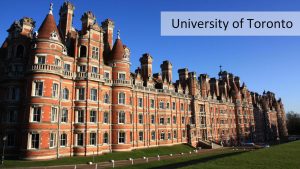It is very unlikely that any experts in reading images can penetrate the cover picture of this story and make a culturally sensitive sense of it. A young Edumoga girl who makes good in the Canadian system reinforces her status as a communal investment and concern, much, much beyond herself. Thus, although this is just her First Degree, her graduation has significance right down to the old women and elders supplicating the ancestors to keep a virtual eye on her at the University of Toronto.
 Going for further education outside the country is no longer news but that is not to say there are no problems attendant on that. Achebe’s novels still contain the classic examples. In No Longer At Ease, the snag is Obi Okonkwo’s failure to read law so that he could sort out land cases involving the community that gave him the scholarship. Instead of reading law, he read English and to make matters worse, he was incapable of deploying jaw breaking words that gave barely lettered folks the psychological satisfaction of good investment. Rather, his grammar was the ‘is’ and ‘was’ type and he impressed no one. In Arrow of God, Ezeulu, the priest king, resolved the doubts about Western education through a strategy of sending Oduche, one of his sons, to the missionary school. His argument is simple. If there was anything good in what the whiteman had brought, Oduche would bring their own share. If there was nothing, he would come back. That pragmatism fell flat as Oduche not only fell in love with the missionary narratives of heathenism but went further to imprison the sacred python, a cultural sacrilege which was to form part of the disconnect between the Monarch and his people.
Going for further education outside the country is no longer news but that is not to say there are no problems attendant on that. Achebe’s novels still contain the classic examples. In No Longer At Ease, the snag is Obi Okonkwo’s failure to read law so that he could sort out land cases involving the community that gave him the scholarship. Instead of reading law, he read English and to make matters worse, he was incapable of deploying jaw breaking words that gave barely lettered folks the psychological satisfaction of good investment. Rather, his grammar was the ‘is’ and ‘was’ type and he impressed no one. In Arrow of God, Ezeulu, the priest king, resolved the doubts about Western education through a strategy of sending Oduche, one of his sons, to the missionary school. His argument is simple. If there was anything good in what the whiteman had brought, Oduche would bring their own share. If there was nothing, he would come back. That pragmatism fell flat as Oduche not only fell in love with the missionary narratives of heathenism but went further to imprison the sacred python, a cultural sacrilege which was to form part of the disconnect between the Monarch and his people.
Although these are not the forms in which the problems occur anymore in the digital age, the cultural tension attendant on education in different cultural or educational settings persist. The fear of his son coming back to Nigeria with his hair plaited like a girl almost gave a Nigerian architect heart attack. Thanks to God, his son came back clean shaven, respectful and normal in the way his family understands these things.

One of the top 20 universities in the world,
So, apart from being an ambassador of an area in Nigeria crying marginalization, Onyemowo has not manifested jumping the cultural ship. Instead, she has matured intellectually and very quickly, writing essays and raising questions on, say, climate change which even the Secretary-General of the UN cannot dismiss. One more reason for her to be proud of her university for making a (potential) intellectual out of a mere eaglet! This is not to talk of the global canvass of her circuit – course mates, personal tutors, lecturers, academic authorities who taught her and so on and so forth.
How great then would it have been if Onyemowo and other Nigerians out there in pursuit of knowledge have all done so for reasons other than that their own country cannot give them education that liberates the mind. It must be a funny kind of patriotism to say that university education in Nigeria is alive and kicking. Still a great system full of great academics here and there, one exceptional department here and there but largely a case of so much to be done, so little done. All the problems that define the crisis of the university system is well known to the highest level of power in Nigeria. Yet, nothing fundamental or game changing ever happens beyond throwing in some money to get ASUU back to work. For example, when the current Executive Secretary of the regulatory agency – the National Universities Commission, (NUC) speaks, he shows a graphic grasp of what and where the problems are. But it is the same NUC that approves some of the names on the accreditation teams that are supposed to plug some of the loopholes. Or, the Joint Admissions and Matriculation Board, (JAMB) – the admission machine – that must be the senior party to the culture of admitting upwards of 1200 students for a course unit. What a country!
Congratulations to Miss Onyemowo Jane Odah!




























